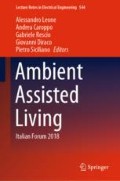Abstract
The elder with mild or moderate cognitive impairment (MMCI) suffers from progressive cognitive decline with increasing difficulties in performing activities of daily living. Information and Communication Technology (ICT) for Healthcare can provide solutions to relief the caregivers’ burden and to support the elder in maintaining dignity and independence. The UNCAP European project aimed at developing and testing a bundle of hardware and software technologies able to fit the individual needs of the elder with MMCI and his/her formal and informal caregivers. A multicenter clinical investigation was designed for assessing improvements in the quality of life of all users (elderly with MMCI and their caregivers) and the impact on the use of resources for care. Six pilot sites in Italy were involved in this clinical investigation. A complex set of assessment tools allowed exploring a wide range of dimensions and to extract common indicators and outcomes in accordance to the assessment dimensions required by the Health Technology Assessment approach.
Access this chapter
Tax calculation will be finalised at checkout
Purchases are for personal use only
References
Aloulou H, Mokhtari M, Tiberghien T et al (2013) Deployment of assistive living technology in a nursing home environment: methods and lessons learned. BMC Med Inform Decis Mak 13:42. https://doi.org/10.1186/1472-6947-13-42
Armstrong N, Nugent C, Moore G et at (2010) Using smartphones to address the needs of persons with Alzheimer’s disease. Ann Telecommun 65:485–495
Bamidis PD, Fissler P, Papageorgiou SG et al (2015) Gains in cognition through combined cognitive and physical training: the role of training dosage and severity of neurocognitive disorder. Front Aging Neurosci 7:152. https://doi.org/10.3389/fnagi.2015.00152
Baruch J, Downs M, Baldwin C et al (2004) A case study in the use of technology to reassure and support a person with dementia. In Moriarty J (ed) Dementia. Innovative practice vol 3(3). SAGE Publications, USA, pp 371–392
Bharucha AJ, Anand V, Forlizzi J et al (2009) Intelligent assistive technology applications to dementia care: current capabilities, limitations, and future challenges. Am J Geriatr Psychiatr: Off J Am Assoc Geriatr Psychiatry 17:88–104. https://doi.org/10.1097/jgp.0b013e318187dde5
Boman IL, Persson AC, Bartfai A (2016) First steps in designing an all-in-one ICT-based device for persons with cognitive impairment: evaluation of the first mock-up. BMC Geriatr 16:61. https://doi.org/10.1186/s12877-016-0238-x
Bossen AL, Kim H, Williams KN et al (2015) Emerging roles for telemedicine and smart technologies in dementia care. Smart Homecare Technol Telehealth 3:49–57. https://doi.org/10.2147/shtt.s59500
Brodaty H, Green A (2002) Who cares for the carer? The often forgotten patient. Aust Fam Phys 31:833
Centers for Disease Control and Prevention (2013) The state of aging and health in America. http://www.cdc.gov/aging/help/dph-aging/state-aging-health.html
Cook DJ, Augusto JC, Jakkula VR (2009) Ambient intelligence: technologies, applications, and opportunities. Pervasive Mob Comput 5:277–298
Glozman JM, Bicheva KG, Fedorova NV (1998) Scale of Quality of Life of Care-Givers (SQLC). J Neurol 245:S39–S41
Lexis M, Everink I, van der Heide L, Spreeuwenberg M et al (2013) Activity monitoring technology to support homecare delivery to frail and psychogeriatric elderly persons living at home alone. Technol Disabil 25:189–197
Logsdon RG, Gibbons LE, McCurry SM et al (2002) Assessing quality of life in older adults with cognitive impairment. Psychosom Med 64:510–509
Medical mood ring (2004) Technology review. http://www.techreview.com/Biotech/13546/. 2007
Mihailidis A, Barbenel JC, Fernie GR (2004) The efficacy of an intelligent orthosis to facilitate handwashing by persons with moderate-to-severe dementia. Neuropsychol Rehabil 14:135–171
Monin J, Schulz R (2009) Interpersonal effects of suffering in older adult caregiver relationships. Psychol Aging 24:681–695
Pot AM, Willemse BM, Horjus S (2012) A pilot study on the use of tracking technology: feasibility, acceptability, and benefits for people in early stages of dementia and their informal caregivers. Aging Ment Health 16:127–134
Prince M, Jackson J (2009) International AD: world alzheimer report 2009. In: Alzheimer’s disease international. http://www.alz.co.uk/research/files/WorldAlzheimerReport.pdf
Reisberg B, Ferris S, De Leon M, Crook T et al (1988) Global deterioration scale (GDS). Psychopharmacol Bull 24:661
Schulz RS, Sherwood PR (2008) Physical and mental health effects of family caregiving. Am J Nurs 108:23–27
Tadiran Life Care Aerotel Medical Systems (2007) http://www.tadlifecare.com/index.php?id=197
Tchalla AE, Lachal F, Cardinaud N et al (2013) Preventing and managing indoor falls with home-based technologies in mild and moderate Alzheimer’s disease patients: pilot study in a community dwelling. Dement Geriatr Cogn Disord 36:251–261
Woods B, Aguirre E, Spector AE et al (2012) Cognitive stimulation to improve cognitive functioning in people with dementia. Cochrane Database Syst Rev 15:2 CD005562
Yardley L, Beyer N, Hauer K et al (2005) Development and initial validation of the Falls Efficacy Scale-International (FES-I). Age Ageing 34:614–619
Zarit S (2006) Assessment of family caregivers: a research perspective. Family Caregiver Alliance, San Francisco, CA
Acknowledgements
The UNCAP project and the research leading to these results has received funding from the European Union’s Horizon 2020 research and innovation programme—Societal Challenge 1 (DG CONNECT/H) under grant agreement No 643555.
Author information
Authors and Affiliations
Corresponding author
Editor information
Editors and Affiliations
Rights and permissions
Copyright information
© 2019 Springer Nature Switzerland AG
About this paper
Cite this paper
Anzivino, S., Nollo, G., Conotter, V., Guandalini, G.M.A., Conti, G., Tessarolo, F. (2019). Designing Multidimensional Assessment of ICTs for Elderly People: The UNCAP Clinical Study Protocol. In: Leone, A., Caroppo, A., Rescio, G., Diraco, G., Siciliano, P. (eds) Ambient Assisted Living. ForItAAL 2018. Lecture Notes in Electrical Engineering, vol 544. Springer, Cham. https://doi.org/10.1007/978-3-030-05921-7_5
Download citation
DOI: https://doi.org/10.1007/978-3-030-05921-7_5
Published:
Publisher Name: Springer, Cham
Print ISBN: 978-3-030-05920-0
Online ISBN: 978-3-030-05921-7
eBook Packages: EngineeringEngineering (R0)

